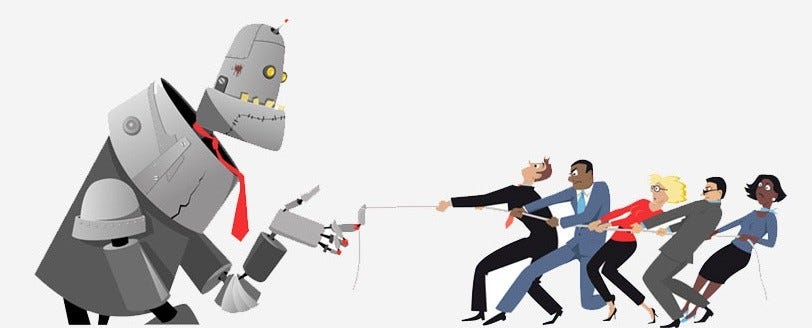Surviving the Rise of A.I. : Evaluating whether or not your job will be replaced by a computer.

As artificial intelligence (AI) continues to advance at a rapid pace, it’s becoming increasingly important for professionals across various industries to understand how this technology might impact their careers. In this article, we will explore the key factors to consider when evaluating whether or not your job can be replaced by AI, as well as offer some insights on how to adapt and thrive in the age of automation.
Understanding AI and Its Capabilities
AI refers to the development of computer systems that can perform tasks that would normally require human intelligence. These tasks include learning, reasoning, problem-solving, perception, and understanding natural language. The capabilities of AI have expanded significantly in recent years due to advancements in machine learning, deep learning, and neural networks.
Job Vulnerability: Routine vs. Non-Routine Tasks
The degree to which a job is susceptible to automation depends largely on the nature of the tasks it involves. In general, jobs that consist mainly of routine tasks are more likely to be replaced by AI. Routine tasks can be divided into two categories:
a. Routine manual tasks: These tasks involve physical labor and are repetitive in nature. Examples include assembly line work, packaging, and sorting.
b. Routine cognitive tasks: These tasks involve mental labor and are also repetitive. Examples include data entry, basic accounting, and scheduling.
Non-routine tasks, on the other hand, are less likely to be replaced by AI. These tasks typically involve problem-solving, critical thinking, creativity, and emotional intelligence. Examples include strategic planning, negotiation, and artistic creation.
AI Adoption in Various Industries
AI has already been adopted in many industries, but the extent of its impact varies considerably. To evaluate the likelihood of your job being replaced by AI, it’s essential to examine the specific industry you work in and assess the current state of AI adoption in that sector. Some of the industries where AI has made significant inroads include:
a. Manufacturing: AI-powered robots have been used to streamline production processes, optimize supply chains, and perform quality control.
b. Healthcare: AI has been utilized for diagnostics, personalized treatment plans, and drug discovery.
c. Finance: AI-powered algorithms are being used for fraud detection, trading, and risk management.
d. Transportation: Autonomous vehicles and drones are being tested and deployed for deliveries and passenger transport.
The Importance of Human Skills in an AI-Driven World
Despite the increasing capabilities of AI, certain human skills will continue to be in high demand. The ability to empathize with others, communicate effectively, and think critically and creatively will set professionals apart in a job market that’s becoming more automated. By focusing on developing these skills, you can improve your chances of remaining relevant and competitive in the workforce.
Assessing the AI Vulnerability of Your Job
To evaluate the likelihood of your job being replaced by AI, consider the following factors:
a. Task composition: Determine the proportion of routine tasks in your job. The higher the percentage of routine tasks, the more likely it is that your job can be automated.
b. Industry trends: Research your industry to understand the current state of AI adoption and its projected impact on your specific job role.
c. Skill set: Reflect on your unique skill set and identify areas where you can develop and improve in order to remain competitive in an AI-driven job market.
Adapting to the Age of Automation
In order to thrive in the age of automation, it’s crucial to be proactive in adapting to the changes brought about by AI. Here are some steps you can take to prepare for the future of work:
a. Lifelong learning: Continuously update your skills and knowledge by pursuing further education, attending workshops, or taking online courses. This will help you stay relevant and competitive in the job market.
b. Embrace technology: Stay informed about the latest technological advancements in your industry and learn how to use new tools and systems that can enhance your productivity and efficiency.
c. Diversify your skills: Develop a diverse skill set that includes both technical and soft skills, such as creativity, critical thinking, and emotional intelligence. This will make you more adaptable to changes in the job market and less likely to be replaced by AI.
d. Networking: Build and maintain a strong professional network, which can help you stay informed about new job opportunities, industry trends, and potential collaborations.
e. Focus on problem-solving: Seek out opportunities to tackle complex challenges and develop innovative solutions. These experiences will help you build a strong portfolio of accomplishments that showcase your ability to thrive in an AI-driven world.
The rise of AI and automation will undoubtedly have a profound impact on the job market in the coming years. By understanding the factors that determine whether your job is at risk of being replaced by AI and taking proactive steps to adapt to the changing landscape, you can ensure that you remain a valuable and competitive member of the workforce.
In conclusion, it’s important to remember that AI technology is not an enemy to be feared, but rather a powerful tool that can be harnessed to improve productivity and create new opportunities. By embracing change and focusing on the development of in-demand human skills, professionals across all industries can adapt and thrive in the age of automation.
Lyron Foster is a Hawai’i based African American Author, Musician, Actor, Blogger, Philanthropist and Multinational Serial Tech Entrepreneur.

